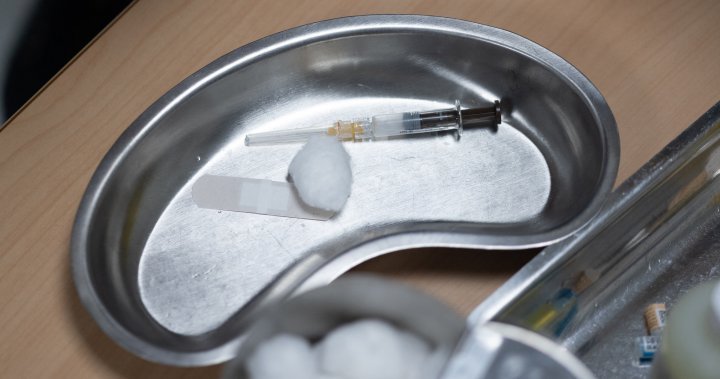Using one dose of the human papillomavirus (HPV) vaccine is as effective in preventing cervical cancer as two or three doses, new research suggests.
A peer-reviewed study published in the Canadian Medical Association Journal (CMAJ) on Monday found that a single dose of HPV vaccine could prevent a similar number of cervical cancers, HPV infections and other HPV-related cancers as a two-dose program among men and women in Canada.
This is if vaccine protection remains high during ages of peak sexual activity, the study states.
The clinical data supporting this was strong for people aged nine to 20 years, said Dr. Chantal Sauvageau, study co-author and public health physician at the National Institute of Public Health of Quebec.
“The study is showing that one-dose schedule with HPV vaccine would result in the same impact as two-or three-dose schedules in preventing infections and cancers and also (it’s) a more efficient way to be using these vaccines,” she told Global News in an interview.

Sauvageau is a member of the National Advisory Committee on Immunization’s HPV Working Group, which proposed changes to vaccination schedules in Canada.

Get weekly health news
Receive the latest medical news and health information delivered to you every Sunday.
In July, NACI updated its recommendations for the HPV vaccine, strongly recommending one dose of the Gardasil-9 shot for Canadians aged nine to 20 years. A two-dose regimen was previously recommended for this age group.
For Canadians aged 21 years and up, the recommendation is now two doses of the Gardasil-9 vaccine – down from three – given six months apart.
For individuals nine years of age and older who are immunocompromised or living with HIV, NACI still recommends a three-dose schedule.
In Canada, Gardasil-9 is the recommended vaccine since it provides protection against the greatest number of HPV types and associated diseases.
NACI told Global News it will continue to monitor evidence of one-dose HPV vaccine schedules as evidence becomes available from clinical trials, Canadian data and other countries where similar schedules are adopted, such as the U.K. and Australia, and will update guidance as needed.
The Canadian recommendation is in line with the World Health Organization, which recommends a one- or two-dose schedule for girls and women aged nine to 20 years and two doses with a six-month interval for patients older than 21 years.

Sauvageau said there is some data suggesting that one dose of HPV vaccine could also be useful for those older than 20, but not enough to make a strong recommendation at this time.
The reduction in doses will free up not only vaccines but also those administrating it, she said, with nurses having to make fewer trips to schools.
It could also help cut costs and increase vaccine uptake, Sauvageau said, pointing to the example of Australia, which also implemented this change last year.
HPV is one of the most common sexually transmitted infections in Canada, with as many as 75 per cent of sexually active adults estimated to be infected at some point in their lives.
The WHO says HPV is the primary cause of cervical cancer, especially if the infection persists, but most infections resolve on their own without symptoms.
In 2022, there were 1,730 new cervix uteri cancer cases and 760 new deaths reported in Canada, according to WHO data.
Sauvageau said the HPV vaccine is “among the best ones” with a high level of efficacy at 95 per cent.
“Even in the most pessimistic scenario that the study looks at, we can see that we will be able to eliminate cervical cancer if we can have a great vaccine coverage. So, these vaccines are really working very well.”
© 2024 Global News, a division of Corus Entertainment Inc.



